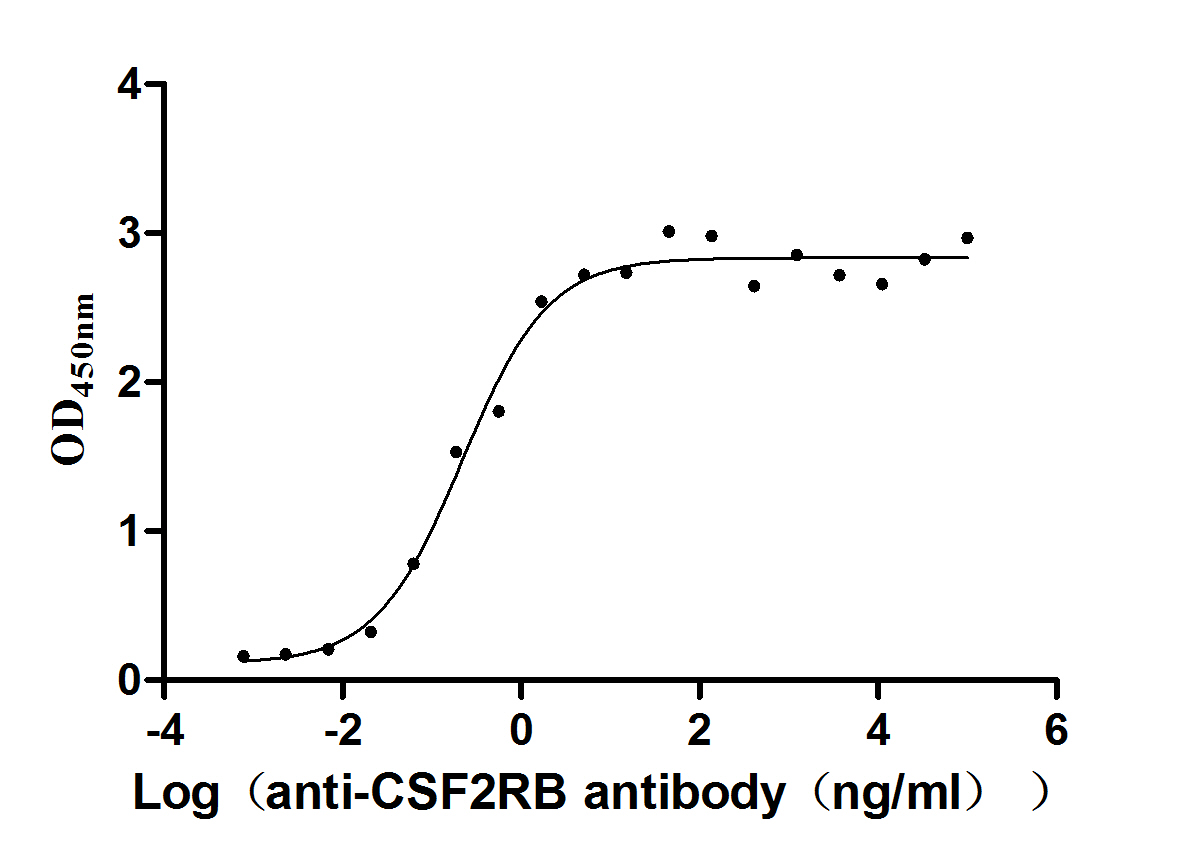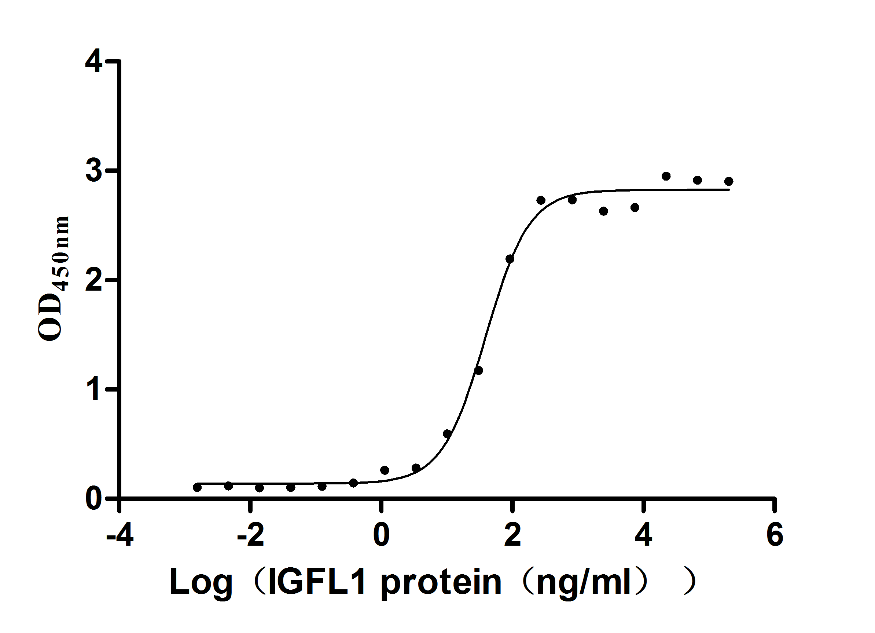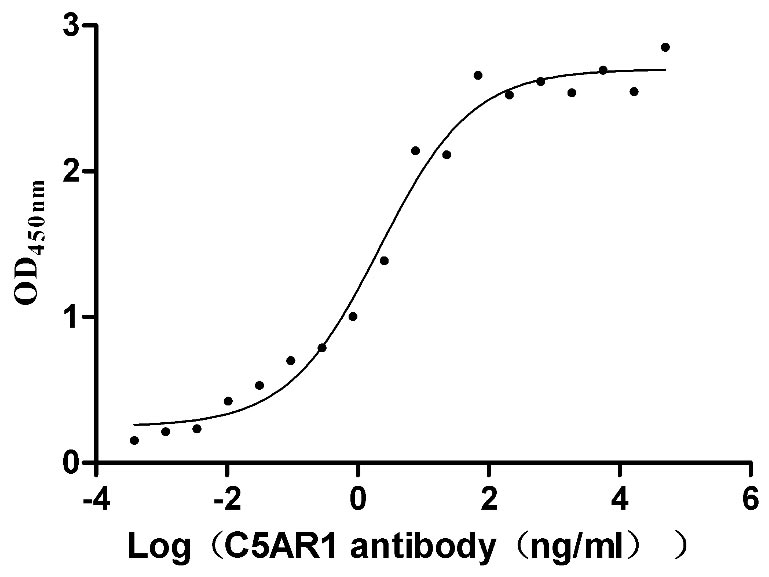Recombinant Human Hepatoma-derived growth factor (HDGF)
-
中文名称:人HDGF重组蛋白
-
货号:CSB-YP010249HU
-
规格:
-
来源:Yeast
-
其他:
-
中文名称:人HDGF重组蛋白
-
货号:CSB-EP010249HU
-
规格:
-
来源:E.coli
-
其他:
-
中文名称:人HDGF重组蛋白
-
货号:CSB-EP010249HU-B
-
规格:
-
来源:E.coli
-
共轭:Avi-tag Biotinylated
E. coli biotin ligase (BirA) is highly specific in covalently attaching biotin to the 15 amino acid AviTag peptide. This recombinant protein was biotinylated in vivo by AviTag-BirA technology, which method is BriA catalyzes amide linkage between the biotin and the specific lysine of the AviTag.
-
其他:
-
中文名称:人HDGF重组蛋白
-
货号:CSB-BP010249HU
-
规格:
-
来源:Baculovirus
-
其他:
-
中文名称:人HDGF重组蛋白
-
货号:CSB-MP010249HU
-
规格:
-
来源:Mammalian cell
-
其他:
产品详情
-
纯度:>85% (SDS-PAGE)
-
基因名:HDGF
-
Uniprot No.:
-
别名:FLJ96580; HDGF; HDGF_HUMAN; Hepatoma derived growth factor; Hepatoma-derived growth factor; High mobility group protein 1 like 2; High mobility group protein 1-like 2; HMG-1L2; HMG1L2
-
种属:Homo sapiens (Human)
-
蛋白长度:Full length protein
-
表达区域:1-240
-
氨基酸序列MSRSNRQKEY KCGDLVFAKM KGYPHWPARI DEMPEAAVKS TANKYQVFFF GTHETAFLGP KDLFPYEESK EKFGKPNKRK GFSEGLWEIE NNPTVKASGY QSSQKKSCVE EPEPEPEAAE GDGDKKGNAE GSSDEEGKLV IDEPAKEKNE KGALKRRAGD LLEDSPKRPK EAENPEGEEK EAATLEVERP LPMEVEKNST PSEPGSGRGP PQEEEEEEDE EEEATKEDAE APGIRDHESL
-
蛋白标签:Tag type will be determined during the manufacturing process.
The tag type will be determined during production process. If you have specified tag type, please tell us and we will develop the specified tag preferentially. -
产品提供形式:Lyophilized powder
Note: We will preferentially ship the format that we have in stock, however, if you have any special requirement for the format, please remark your requirement when placing the order, we will prepare according to your demand. -
复溶:We recommend that this vial be briefly centrifuged prior to opening to bring the contents to the bottom. Please reconstitute protein in deionized sterile water to a concentration of 0.1-1.0 mg/mL.We recommend to add 5-50% of glycerol (final concentration) and aliquot for long-term storage at -20℃/-80℃. Our default final concentration of glycerol is 50%. Customers could use it as reference.
-
储存条件:Store at -20°C/-80°C upon receipt, aliquoting is necessary for mutiple use. Avoid repeated freeze-thaw cycles.
-
保质期:The shelf life is related to many factors, storage state, buffer ingredients, storage temperature and the stability of the protein itself.
Generally, the shelf life of liquid form is 6 months at -20°C/-80°C. The shelf life of lyophilized form is 12 months at -20°C/-80°C. -
货期:Delivery time may differ from different purchasing way or location, please kindly consult your local distributors for specific delivery time.Note: All of our proteins are default shipped with normal blue ice packs, if you request to ship with dry ice, please communicate with us in advance and extra fees will be charged.
-
注意事项:Repeated freezing and thawing is not recommended. Store working aliquots at 4°C for up to one week.
-
Datasheet :Please contact us to get it.
相关产品
靶点详情
-
功能:Acts as a transcriptional repressor. Has mitogenic activity for fibroblasts. Heparin-binding protein.; Does not have mitogenic activity for fibroblasts. Does not bind heparin.; Has mitogenic activity for fibroblasts. Heparin-binding protein.
-
基因功能参考文献:
- miR139 was downregulated in epithelial ovarian cancer, and acted as a tumor suppressor by directly targeting HDGF. PMID: 28713954
- high serum levels of HDGF were significantly correlated to bone metastasis and poorer prognosis of non-small cell lung cancer. PMID: 28592712
- Data suggested that HDGF knockdown inhibits cellular migration and invasion in vitro of prostate cancer via modulating epithelial-mesenchymal transition signaling pathway, as well as MMP2 and MMP9 signaling pathway. These results supported that HDGF is a relevant protein in the progression of prostate cancer and may serve as a potentially therapeutic target for prostate cancer as well as its downstream targets. PMID: 29300772
- HDGF is overexpressed in both androgen-sensitive and androgen-insensitive cell lines. Forced overexpression enhanced cell viability but knockdown reduced proliferation of benign prostate cells.Ectopic HDGF overexpression of HDGF in up-regulated cyclin E and BCL-2, but down-regulated BAX. Treatment with a HDGF monoclonal antibody and vitamin K2 reduced proliferation and inhibited NF-kB expression in a tumor cell line. PMID: 27692835
- functional diversity of HDGF isoforms PMID: 27926477
- our findings first indicate that the interaction of HDGF and beta-catenin may play a crucial role in tumorigenesis of synovial sarcoma. PMID: 26842923
- HDGF was overexpressed in hepatocellular carcinoma patients and cells. PMID: 27273265
- miRNA497 directly targets hepatomaderived growth factor (HDGF) in prostate cancer cells. PMID: 26780929
- describe two previously unknown HDGF isoforms, HDGF-B and HDGF-C, generated via alternative splicing with structurally unrelated N-terminal regions of their hath region PMID: 26845719
- study uncovers a novel function of HDGF as a messenger of cellular condition (alarmin) which in-turn modulates cellular function-aspects that could be used as a biomarker for ovarian cancer. PMID: 26612514
- HDGF and beta-catenin interact as a positive feedback loop, which plays an important role in carcinogenesis and progression of colorectal carcinoma. PMID: 26296979
- HDGF is important in promoting malignant biological behaviors, including proliferation, migration and invasion of hilar cholangiocarcinoma cells. PMID: 26081074
- Hepatoma-derived growth factor overexpression is involved in liver carcinogenesis. PMID: 25938538
- Meta-analysis results provide evidence that HDGF may be a new indicator of poor cancer prognosis. PMID: 25773828
- HDGF contains conserved N-terminal HATH domains with a characteristic structural motif, namely the PWWP motif. This study defines the role of the first residue of the PWWP motif in modulating HATH domain stability and oligomer formation in binding. PMID: 26067205
- HDGF overexpression is common in early-stage cervical adenocarcinoma. PMID: 25421244
- The expression level of hepatoma-derived growth factor (HDGF) significantly decreased in response to the virus-associated RNAs under replication-deficient condition. PMID: 25275311
- HDGF can promote IHCC cells progression, including proliferation, invasion, and angiogenesis PMID: 25262276
- Results suggest that HDGF downregulation significantly suppresses glioma cell proliferation, migration, invasion in vitro and tumorigenesis in vivo is probably involved in the activation of both the PI3K/Akt and the TGF-beta signaling pathways PMID: 24986090
- These data suggested that irradiated fibroblasts promoted invasion, growth, EMT and HDGF expression of ESCC. PMID: 25677618
- The expression of nuclear HDGF might be closely related to the carcinogenesis, clinical biological behaviors, and prognosis of gallbladder adenocarcinoma. PMID: 25071353
- HDGF is a potential unfavorable factor for the progression and prognosis of endometrial carcinoma. PMID: 24692842
- Data indicate that hepatoma-derived growth factor (HDGF) was a target of miR-195 in non-small cell lung cancer (NSCLC) cells. PMID: 24891187
- expression of HDGF was negatively correlated with miR-141 in gastric cancer tissues: the suppressive effects of miR-141 on GC cell proliferation, colony formation, in vitro migration, and invasion were partially mediated by suppressing HDGF expression. PMID: 24276755
- ADAM9 high expression is correlated positively and significantly with HDGF high expression in non-small cell lung cancer. PMID: 24770635
- Patients with higher HDGF and CD31 expression level had poorer overall survival rates. PMID: 23771798
- Positive expression of HDGF was detected in 46.2 % of patients with extrahepatic cholangiocarcinoma and correlated with poor tumor differentiation. The HDGF expression group had lower survival than the negative HDGF expression group. PMID: 23793608
- Combining p53 expression and HDGF expression significantly improved prognostic stratification for patients with Ewing family tumor. PMID: 24072730
- Together, these results indicate that HDGF downregulation participates in POMC-induced suppression of metastasis and EMT in melanoma. PMID: 23468531
- Suggest that HDGF exhibits oncogenic properties and may be a novel prognostic factor in Ewing's sarcoma. PMID: 23878072
- Up-regulation of hepatoma-derived growth factor facilities tumor progression in malignant melanoma. PMID: 23536873
- The suppressive effect of miR-16 on cell proliferation, colony formation, migration, and invasion is partially mediated by inhibiting HDGF expression. PMID: 23954293
- Studied HDGF in gallbladder cancer (GBC).Patients with nuclear HDGF-pos tumors had worse survival than patients with HDGF-negative tumors. Treatment of GBC-SD and SGC-996 lines with HDGF-siRNA significantly reduced the proliferation of GBC cell lines. PMID: 23609195
- Tumor samples from non-small cell lung cancers show an inverse relationship between microRNA-497 and HDGF levels, and ectopic expression of miR-497 significantly inhibited tumor growth and angiogenesis in a xenograft model PMID: 23673296
- Expression of a cytosolic variant of hepatoma-derived growth factor causes a redistribution of nucleolin into the cytoplasm. PMID: 23305559
- Hepatoma-derived growth factor regulates breast cancer cell invasion by modulating epithelial--mesenchymal transition. PMID: 22247069
- Hepatoma-derived growth factor overexpression contributes to the oncogenic processes in oral cancer cells PMID: 22361040
- Differential proteomic analysis of human glioblastoma and neural stem cells reveals HDGF as a novel angiogenic secreted factor PMID: 22331796
- High hepatoma-derived growth factor is associated with gliomas. PMID: 22037800
- The interactome suggests that HDGF is a multifunctional protein and participates in many cellular events, including ribosome biogenesis, RNA processing, DNA damage repair and transcriptional regulation. PMID: 21907836
- found that HDGF was overexpressed also in primary gastric, breast, and lung cancer tissues harboring mutant p53 genes PMID: 22006999
- HDGF was highly expressed in 158 non-small cell lung cancer tissues compared with normal control. PMID: 21426662
- High HDGF is associated with hilar cholangiocarcinoma. PMID: 20848225
- Increased nuclear expression of HDGF is a potential unfavourable prognostic factor for patients with hepatoma-derived growth factor PMID: 21255068
- High HDGF expression is associated with poor overall survival in patients with hepatocellular carcinoma. Down-regulation of HDGF inhibits the growth, anchorage-independent growth, migration and invasion of HepG2 cells. PMID: 20846397
- High hepatoma-derived growth factor is associated with colorectal carcinoma. PMID: 19924574
- results suggest that HDGF is involved in cell growth, cell invasion, and apoptosis PMID: 21302807
- The present study is aimed at examining the role of HDGF in keloid pathogenesis. PMID: 19432814
- HDGF expression is upgraded in postoperative stage I non-small cell lung cancer patients, and is a significantly independent predictive factor. PMID: 18478933
- Hepatoma-derived growth factor stimulates cell growth after translocation to the nucleus PMID: 11751870
显示更多
收起更多
-
亚细胞定位:[Isoform 1]: Nucleus. Cytoplasm. Secreted, extracellular exosome.; [Isoform 2]: Nucleus. Cytoplasm. Secreted, extracellular exosome.; [Isoform 3]: Nucleus. Cytoplasm. Secreted, extracellular exosome.
-
蛋白家族:HDGF family
-
组织特异性:Ubiquitous.
-
数据库链接:
HGNC: 4856
OMIM: 600339
KEGG: hsa:3068
STRING: 9606.ENSP00000357189
UniGene: Hs.743948
Most popular with customers
-
Recombinant Human Cytokine receptor common subunit beta (CSF2RB), partial (Active)
Express system: Mammalian cell
Species: Homo sapiens (Human)
-
Recombinant Human IGF-like family receptor 1 (IGFLR1), partial (Active)
Express system: Mammalian cell
Species: Homo sapiens (Human)
-
Recombinant Human C5a anaphylatoxin chemotactic receptor 1 (C5AR1)-VLPs (Active)
Express system: Mammalian cell
Species: Homo sapiens (Human)
-
Recombinant Human Epithelial discoidin domain-containing receptor 1 (DDR1), partial (Active)
Express system: Mammalian cell
Species: Homo sapiens (Human)
-
Recombinant Human Microtubule-associated protein tau (MAPT) (Active)
Express system: Mammalian cell
Species: Homo sapiens (Human)






-AC1.jpg)










